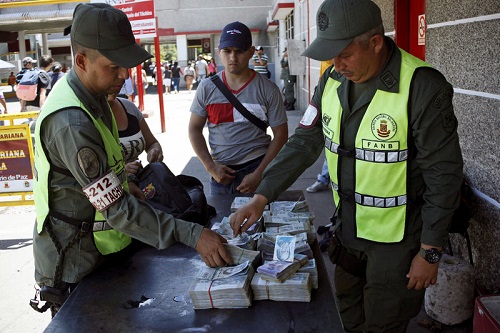Reuters photo
By
Ricardo Swire
A senior Bolivarian National Guard member, assigned to the Venezuelan/Colombian border, is envied as working in the most financially lucrative area of the local military. Nationally more than US$3 million monthly is unofficially earned from Venezuela’s illegal fuel smuggling market. US$1 currently values Bolivars$9.98. Since the country’s downward economic spiral a nourishing and immense underworld petrol market has enriched a novel criminal group.
CARICOM intelligence data dictated the Colombia/Venezuela border has forever been a smuggler’s paradise. Traffickers initially monopolized the area with cocaine and heavily subsidized gasoline shipments. One 2015 American counter-narcotics report estimated more than half of all cocaine consignments exported from Colombia were warehoused in Venezuela, prior to distribution on international markets. The national security relaxation provided easier entry to Venezuela’s South Mercosur market.
Mercosur officially refers to the Southern Common Market, a South American trade bloc. Bolivarian National Guard “chamos” have allowed high-ranking rogue officers to become millionaires while overseeing border duties. In March 2015 a national security operation was launched on the perimeter. Targeted crossing points were closed and the Venezuelan and Colombian ambassadors recalled in a diplomatic fracas. A tactical counteraction, “Operation for the Liberation of the People” (OLP), involved Venezuelan troops that included two thousand armed forces personnel, who were re-deployed to border protection duties.
In 2016 Bolivarian National Armed Forces corruption peaked. Three hundred and thirteen rogue members of the military, police and intelligence unit (Sebin) were penalized for assisting with petrol smuggling. The Contraband Cartel wielded command and control over fuel smuggling operations along the border. Its criminal mechanism replaced the antiquated “caravans of death” that journeyed from Colombia to Venezuela and back. Illegal petrol shipments are mostly transported from Maracaibo, the capital of Zulia state in Venezuela, to Maicao city in La Guajira.
Maicao easily qualified as the perfect launch pad for Contraband Cartel’s transportation and sales teams to retail illegal Venezuelan gasoline across Colombia. Seventy percent of Maicao’s economy is unofficially devoted to smuggling. For four years “Kiko” was the Contraband Cartel’s top boss. The trafficker was also former governor of La Guajira, Colombia’s Northern Province. Kiko was assisted by co-leader “Marquitos” his trusted logistics coordinator. The duo used two main strategies to maximise profitability from the fuel scheme’s network. First, “cooperatives” legitimized the contraband gasoline hustle via a creative process called “lavar,” the Spanish term associated with money laundering schemes.
After Venezuelan gasoline enters Colombia the price of one gallon increases three thousand seven hundred times to Bolivars$2.07 or US.20 cents. Secondly, Contraband Cartel emissaries dispatch “gasoline laden cars” to Cuestecitas in Albania town. Albania was originally the exclusive campsite for Cerrejon coal miners. One secret trafficking route runs between Táchira State Venezuela and Guajira in Colombia. Along such journey the Guajiros Indians and Bolivarian National Guard soldiers stationed at four checkpoints receive unofficial Contraband Cartel retainers. Records highlighted the National Guardsman who accepted Bolivars$5000 or US$500 from each illegal fuel trip.
Ricardo Swire
Ricardo Swire is the Principal Consultant at R-L-H Security Consultants & Business Support Services and writes on a number of important issues.



No Comments Yet!
You can be first to comment this post!